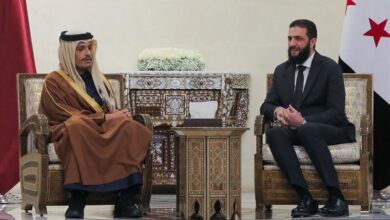
The National Coalition holds a workshop to discuss judicial matters in Syria
Yesterday, Wednesday, the General Secretariat of the National Opposition Coalition announced the holding of a workshop on the judiciary in Syria, during which it discussed the constitutional and legal problems that the judicial authority suffers from and ways to correct the course of the judiciary in the country.
The workshop was supervised by the Secretary-General of the Coalition, Abdul Basit Abdul Latif, and members of the political body Yasser Al-Farhan and Yahya Maktabi, members of the Public Authority, Adnan Rahmon and Ahmed Shehadi, and some opposition political figures participated in it.
Abdul Basit Abdul Latif said: “The constitutional and political imbalances that Syria suffered during the decades of the Assad regime’s seizure of power in the country, had a disastrous impact on the judiciary, its independence and integrity.
“These imbalances require diligent work to develop a comprehensive legal and constitutional reform vision for the affairs of the judiciary in Syria,” he added.
He stressed that there are basic demands of the Syrian revolution that must be implemented after the toppling of the Assad regime, namely: achieving the principle of the rule of law, stopping attempts to evade punishment, accountability, respecting rights and freedoms, and achieving equality in citizenship.
The attendees discussed the most important obstacles facing the independence of the judiciary in Syria, especially the executive authority’s encroachment on the judiciary, the multiplicity of bodies that exercise the judiciary alongside the judiciary in the form of an exceptional judiciary, as well as legislative decrees and laws that strip the ordinary judiciary part of its jurisdiction and prevent it from considering some crimes.
In the interest of the military judiciary or that prevents those affected from resorting to the courts.
They discussed the problems of interference in the affairs of the judiciary, the weakness of the judiciary’s impartiality, the small number of judges and the lack of interest in them, and even the deliberate keeping of them in a weak materially and morally position by the system to create an environment of corruption and favoritism.
The workshop ended with a number of proposals and recommendations, including: Addressing these obstacles and securing the independence of the judiciary, preventing interference in the judiciary, achieving impartiality and unifying the judiciary bodies, and it was also agreed to hold a subsequent meeting to complete and enrich the topics presented, in order to reach a comprehensive reform code for the judiciary in future Syria.




